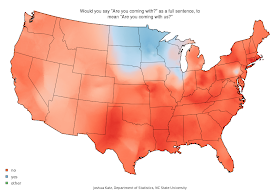The maps should be self-evident; if not, this explanation is offered:
Using data from Bert Vaux's dialect survey, we examine regional dialect variation in the continental United States. Each observation can be thought of as a realization of a categorical random variable with a particular parameter vector that is a function of location—our goal was to interpolate among these points in order to estimate these parameter vectors at a given location, making use of a combination of kernel density estimation and non-parametric smoothing techniques.There are over a hundred more maps from the project, which wordsmiths will enjoy exploring.




I'm a tad disappointed by map #4's failure to provide "Yinz" option to account for its widespread use in Western Pennsylvania.
ReplyDeleteOn the web page it says, "At the moment, only the four most popular answers for each survey question are displayed."
DeleteI'm from southwestern NC. The map doesn't show it, but people in my area say crawdad more often than crawfish.
ReplyDeleteAs a non-American, here are my answers for the first 80 questions, by the colours. Obviously, the occasional error is possible.
ReplyDeleteDeclined to answer: 5, 6, 8, 9, 11, 14, 19, 23, 24, 34, 42, 46, 50, 64, 72, 74, 77
Red: 7, 10, 16, 18, 20, 22, 25, 28, 30-33, 36-38, 43, 45, 47-49, 51-60, 63, 67, 69, 70, 80
Blue: 1, 4, 13, 17, 26, 29, 35, 39, 40, 41, 44, 62, 66, 68, 71*, 73, 79
Green: 2, 12, 15, 21, 27, 61, 65, 78
Grey/Yellow: 3, 75, 76
* assuming spelling
I stopped at 80 because I noticed myself getting tired and inclined to make mistakes, but if you'd like I can come back later and answer the rest.
Q: What's the plural of "y'all"
ReplyDeleteA: "all y'all"
Yes, I commonly encountered "all y'all" when I lived in Dallas.
DeleteWow. Pardon me, but those maps suck. Who did they ask?
ReplyDeleteI grew up in and around St Louis, so I would look at this based on my childhood. Three out of the four got my area dead wrong. FYI, St Louis is the bulge on the eastern side of Missouri, so it is pretty impossible to mistake its location.
"Are you coming with?" - this was normal there.
It wasn't "crawfish," and it wasn't "crayfish." It was "crawdad." 100% crawdads. NOBODY called them crayfish there. We were aware that other parts of the country called them crawfish.
"Lightning bugs" - correct.
I MYSELF, because of English class, didn't use the term, but everybody else said, "Y'all." Everybody. "Y'all," to me, was ignorant. But it was all around me.
WHO did these people ask???
All you have to do to is follow the clicks to find the participant data:
Deletehttp://www4.uwm.edu/FLL/linguistics/dialect/staticmaps/q_all.html
"Are you coming with" sounds like a construction from the Scandinavian languages. In Swedish, for example, they say "Ska du följa med." Is it any wonder that the area where that is said in English the most is the area of the country were the Squareheads settled in the greatest numbers?
ReplyDeleteAn interesting observation. Thank you, c.w.
Delete"Are you coming with" would be diagrammed with the "us" implied. In German, it would be, "Kommst mit?"
DeleteRe: Crayfish. I recall a story from somewhere where a lady (tourist) in New Orleans ordered crayfish and got upset because the waiter set before her a "bowl of bugs!"
Lurker111